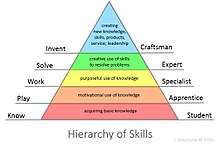Skill
A skill is the ability to perform an action with determined results often within a given amount of time, energy, or both. Skills can often be divided into domain-general and domain-specific skills. For example, in the domain of work, some general skills would include time management, teamwork and leadership, self-motivation and others, whereas domain-specific skills would be used only for a certain job. Skill usually requires certain environmental stimuli and situations to assess the level of skill being shown and used.
People need a broad range of skills to contribute to the modern economy. A joint ASTD and U.S. Department of Labor study showed that through technology, the workplace is changing, and identified 16 basic skills that employees must have to be able to change with it.[1] Three broad categories of skills are suggested and these are technical, human, and conceptual.[2] The first two can be substituted with hard and soft skills, respectively.[3]
Hard skills
Hard skills, also called technical skills, are any skills relating to a specific task or situation. It involves both understanding and proficiency in such specific activity that involves methods, processes, procedures, or techniques.[4] These skills are easily quantifiable unlike soft skills, which are related to one's personality.[5] These are also skills that can be or have been tested and may entail some professional, technical, or academic qualification.[6]
Labor skills
Skilled workers have long had historical import (see Division of labor) as electricians, masons, carpenters, blacksmiths, bakers, brewers, coopers, printers and other occupations that are economically productive. Skilled workers were often politically active through their craft guilds.[7]
Life skills
An ability and capacity acquired through deliberate, systematic, and sustained effort to smoothly and adaptively carryout complex activities or job functions involving ideas (cognitive skills), things (technical skills), and/or people (interpersonal skills).
People skills
According to the Portland Business Journal, people skills are described as:[8]
- understanding ourselves and moderating our responses
- talking effectively and empathizing accurately
- building relationships of trust, respect and productive interactions.
A British definition is "the ability to communicate effectively with people in a friendly way, especially in business."[9] The term is not listed yet in major US dictionaries.[10]
The term people skills is used to include both psychological skills and social skills but is less inclusive than life skills.
Social skills
Social skill is any skill facilitating interaction and communication with others. Social rules and relations are created, communicated, and changed in verbal and nonverbal ways. The process of learning such skills is called socialization.
Soft skills
Soft skills are a combination of interpersonal people skills, social skills, communication skills, character traits, attitudes, career attributes and emotional intelligence quotient (EQ) among others.[11]
Hierarchy of Skills
Skills can be categorized based on the level of expertise and motivation. The highest level of engagement corresponds to the craftsman. About 2% of people reach the highest level.[12]

See also
- Communication skills
- Deskilling
- DISCO - European Dictionary of Skills and Competences
- Dreyfus model of skill acquisition
- Game of skill
- Online skill-based game
- Procedural knowledge
- Transferable skills analysis
References
- "Publications and Research Search Results, Employment & Training Administration (ETA)". wdr.doleta.gov. U.S. Department of Labor. Archived from the original on 28 April 2018. Retrieved 28 April 2018.
- Sommerville, Kerry (2007). Hospitality Employee Management and Supervision: Concepts and Practical Applications. Hoboken, NJ: John Wiley & Sons, Inc. p. 328. ISBN 9780471745228.
- Rao, M.S. (2010). Soft Skills - Enhancing Employability: Connecting Campus with Corporate. New Delhi: I. K. International Publishing House Pvt Ltd. p. 225. ISBN 9789380578385.
- DuBrin, Andrew (2008). Essentials of Management. Mason, OH: South-Western Cengage Learning. p. 16. ISBN 9780324353891.
- Staff (15 May 2010). "Hard Skills". Investopedia. Archived from the original on 5 December 2013. Retrieved 28 April 2018.CS1 maint: uses authors parameter (link)
- Carter, Jenny; O'Grady, Michael; Rosen, Clive (2018). Higher Education Computer Science. Cham: Springer. p. 223. ISBN 9783319985893.
- Cowan, Ruth Schwartz (1997). A Social History of American Technology. New York: Oxford University Press. p. 179. ISBN 0-19-504605-6.
- Rifkin, H. (18 July 2008). "Invest in people skills to boost bottom line". Portland Business Journal. Archived from the original on 18 July 2008. Retrieved 14 October 2009.
- “Macmillan Dictionary” Archived 5 November 2009 at the Wayback Machine Retrieved on 2009-08-18
- Dictionary.com definition. Retrieved on 2009-08-18
- Robles, Marcel M. (12 August 2016). "Executive Perceptions of the Top 10 Soft Skills Needed in Today's Workplace". Business Communication Quarterly. 75 (4): 453–465. doi:10.1177/1080569912460400.
- Igor Kokcharov, Hierarchy of Skills http://www.slideshare.net/igorkokcharov/kokcharov-skillpyramid2015
External links
| Wikimedia Commons has media related to Skills. |
| Wikiquote has quotations related to: Skill |